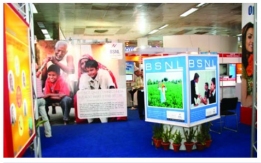Expansion Mode - BSNL looks at increasing role for infrastructure sharing

-
Given these issues, infrastructure sharing has become very important.Sharing enables operators to reduce capex, which is imperative considering the current situation of declining tariffs and ARPU. Moreover, it alleviates, to an extent, the problems associated with the various municipal regulations that stall the installation of telecom towers in cities. Recognising the immediate need for sharing, the Government of India has permitted active infrastructure sharing. The sharing of passive infrastructure was permitted earlier.
Over the past two years, telecom operators have taken a number of initiatives for infrastructure sharing. Now, even independent infrastructure providers have come out with plans. Stand-alone tower companies provide complete base transceiver station (BTS) infrastructure which includes towers, batteries, power plants, shelters, air conditioning and alternators.Many operators have hived off their infrastructure subsidiaries, forming separate businesses altogether.
Bharat Sanchar Nigam Limted (BSNL) has about 72 million connections, the highest in the country. We have a massive expansion plan involving the addition of about 100 million connections in the coming three to four years as well as full mobility in the CDMA network, which has been permitted by the government. We also plan to roll out an extensive broadband network, both on wireline and wireless, using Wi-Max technology. All this will require the addition of a number of BTSs for GSM, CDMA and Wi-Max.
The capacity of BSNL's existing infrastructure allows only a limited amount of infrastructure sharing (on a one-to-one basis). However, the new infrastructure we build will have sufficient tower and antenna capacity, and we would like to share that infrastructure with other operators so that the capex can be reduced.
BSNL has started sharing its infrastructure with independent infrastructure providers. In fact, the company issued a request for proposal sometime back, to which there was a very good response. We have selected six companies that are now providing infrastructure to us. We intend to open up further and have collaborations with more companies, so that we have a large number of towers that can be shared by independent infrastructure providers as well as service providers.
Now that the government has permitted active infrastructure sharing, we are considering this option as well. In any case, we are augmenting our backbone this year, and will probably be able to share it with other service providers for providing at least the backhaul on the core network.With this, there will be a good beginning to active infrastructure sharing.
Under the first part of the government's infrastructure sharing project, about 8,000 towers will be set up in the rural areas.BSNL will put up 7,871 towers, which will eventually be shared by all service providers. Under the second phase of the project, the Universal Service Obligation Fund will invite bids for 11,000 towers.BSNL is talking to other operators to bid in a group. All this would lead to a really good beginning on the part of BSNL with regard to shared infrastructure.
As far as infrastructure management is concerned, the independent companies can focus on it in a better way. They can monitor the infrastructure, ensure minimum BTS downtime, DG set auto-start/shut-off, etc. BSNL is also considering setting up a separate company for infrastructure. However, certain issues on sharing, especially those related to security, have to be taken care of.Overall, we are a keen participant in infrastructure sharing.
Kuldeep Goyal, chairman and managing director, BSNL
- Most Viewed
- Most Rated
- Most Shared
- Related Articles
- Manufacturing Hub: India emerges as a ke...
- TRAI performance indicator report for Se...
- Prashant Singhal, partner, telecom indus...
- 2G spectrum scam: continuing controversy
- An Eventful Year: Telecom highlights of ...
- Telecom Round Table: TRAI’s spectrum p...
- Manufacturing Hub: TRAI recommends indig...
- Linking Up: ITIL to merge with Ascend
- High Speed VAS - Killer applications w...
- Bharti Airtel seals deal with Zain - Zai...






